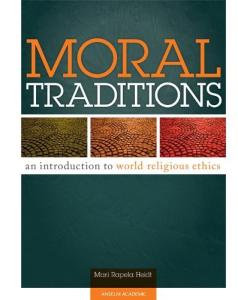Explore a wide variety of thought-provoking resources on morality that challenge and inspire. Dive into ethical dilemmas, philosophical discussions, and personal reflections on what it means to live a moral life. Delve into the complexities of right and wrong, virtue and vice, and the human experience of navigating ethical decisions.
Morality
as a Characteristic of Religion
Product List

Moral Traditions: An Introduction to World Re...
Product Review Score
4.53 out of 5 stars
157 reviews

Ethics and World Religions: Cross-Cultural Ca...
Product Review Score
4.14 out of 5 stars
19 reviews

Comparative Religious Ethics: A Narrative App...
Product Review Score
4.64 out of 5 stars
159 reviews

Beyond Religion: Ethics for a Whole World by...
Product Review Score
4.75 out of 5 stars
103 reviews


Code or morality, as a characteristic of religion, refers to the set of principles and values that guide the behavior and actions of its followers toward living a morally upright and values-driven life. It is a fundamental aspect of religion that shapes its adherents' beliefs, attitudes, and actions.
The primary goal of incorporating a code or morality into religion is to provide a moral framework for individuals to live by, guiding them toward leading a virtuous and ethical life. This code may include guidelines for personal conduct, interpersonal relationships, and societal responsibilities.
Religious codes of morality are often derived from sacred texts, teachings, and traditions and are considered divinely inspired. They serve as a moral compass for believers, helping them navigate life's challenges and make decisions that align with their religious beliefs.
A code or morality within religion provides a moral framework and creates a sense of community and identity among its followers. As individuals share common values and principles, they form a bond and feel a sense of belonging to a larger group. This fosters a sense of unity and cooperation among believers, promoting a peaceful and harmonious society.
Moreover, religious codes of morality also play a significant role in shaping societal norms and values. As religious teachings and principles are often deeply ingrained in the culture and traditions of a community, they influence the moral standards and expectations of society as a whole. This can profoundly impact a society's ethical and moral fabric, promoting a more just and compassionate way of life.
However, incorporating a code or morality in religion can also be a source of controversy and conflict. Different interpretations of religious teachings and principles can lead to disagreements and divisions among followers, causing tension and even violence in some cases. In addition, the strict adherence to religious codes of morality can also limit individual freedom and expression, leading to a lack of tolerance and acceptance of diversity.
Furthermore, a code or morality in religion also aims to cultivate virtues and character traits, such as compassion, forgiveness, and humility, necessary for personal growth and spiritual development. Depending on the specific beliefs of the religion, these qualities are considered essential for achieving a higher state of being and attaining salvation or enlightenment.
Religious codes or morality vary among different faiths, but they often share similar principles and values. For example, the Golden Rule, which states "Do unto others as you would have them do unto you," is a common moral guideline found in many religions, including Christianity, Judaism, and Islam.
Another essential aspect of a code or morality in religion is the concept of sin and moral responsibility. In many religions, believers are expected to adhere to specific ethical standards. They are held accountable for any actions that go against these standards. This is a deterrent for immoral behavior and encourages individuals to strive for righteousness and moral excellence.
Despite these challenges, religious codes of morality continue to play a significant role in shaping the beliefs and actions of billions of people around the world. They serve as a moral compass for individuals, promoting a sense of community and personal growth and influencing societal norms and values. As long as they are practiced with love, compassion, and understanding, these codes can be powerful for positive change and contribute to a more harmonious and moral society.
In summary, the primary purpose of incorporating a code or morality into religion is to guide individuals towards living a virtuous and ethical life, fostering a sense of community and promoting personal growth and spiritual development. It is a vital aspect of religion that helps individuals align their actions with their beliefs and values, ultimately leading to a more fulfilling and purposeful life.